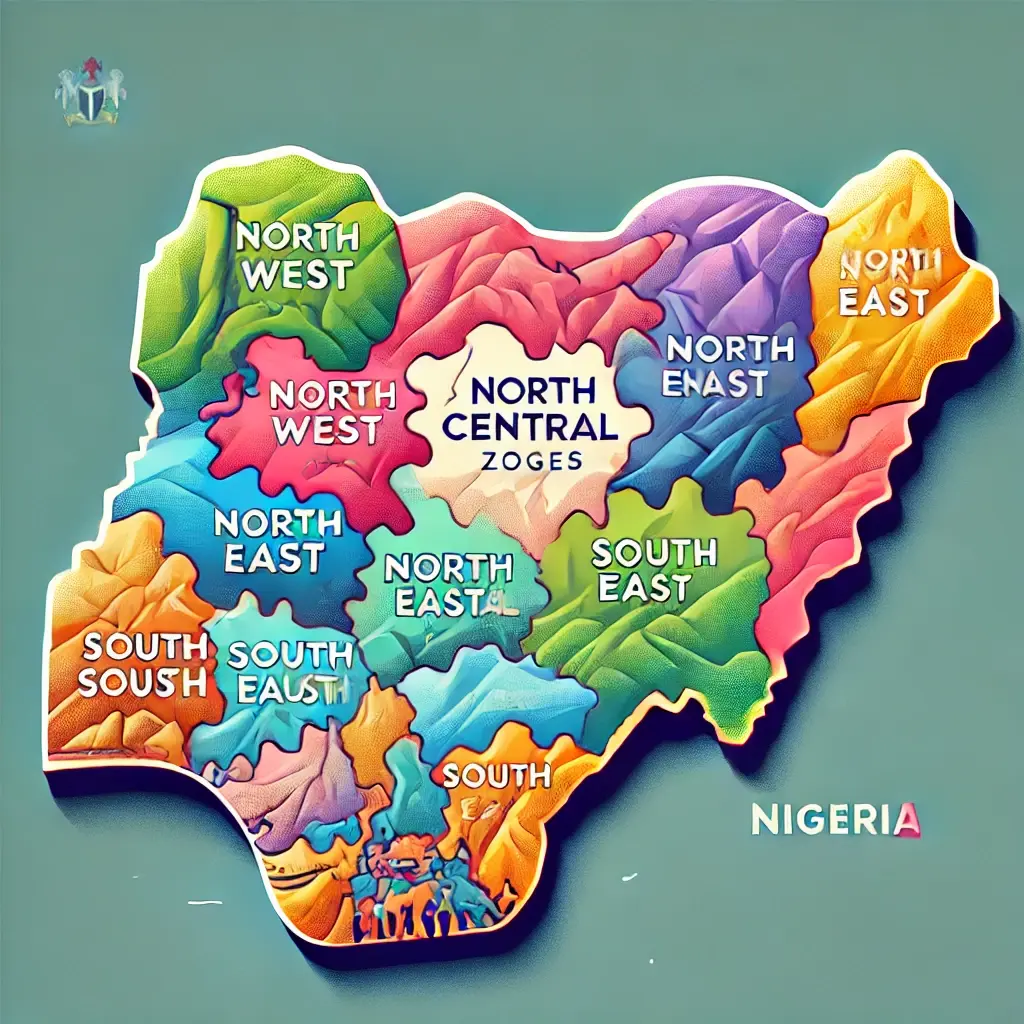Exploring Nigeria’s Geopolitical Zones: An Overview of the 6 Regions
Exploring Nigeria’s Geopolitical Zones: An Overview of the 6 Regions
Nigeria, Africa’s most populous country, is divided into six geopolitical zones. Each zone is unique in its cultural, economic, and political makeup. Understanding these zones is essential for grasping the country’s diverse landscape. Here’s an overview of Nigeria’s six geopolitical zones.
1. North West Zone
States: Jigawa, Kaduna, Kano, Katsina, Kebbi, Sokoto, and Zamfara
Overview: The North West is known for its significant agricultural activities, particularly in crops like groundnuts, cotton, millet, and sorghum. It is also home to Nigeria’s second-largest city, Kano, which is a major commercial and industrial hub.
Key Features:
- Agriculture: Major producer of crops and livestock.
- Commerce: Kano serves as a key commercial center with a historical significance in trans-Saharan trade.
- Cultural Heritage: Rich in Hausa-Fulani culture, with numerous festivals and historical sites.
Sources:
2. North East Zone
States: Adamawa, Bauchi, Borno, Gombe, Taraba, and Yobe
Overview: The North East is characterized by its diverse ethnic groups and challenging climate conditions. It has faced significant security challenges due to insurgency but remains pivotal in agriculture and natural resources.
Key Features:
- Agriculture: Known for livestock farming and crops like maize, millet, and sorghum.
- Natural Resources: Rich in solid minerals such as gypsum, limestone, and uranium.
- Challenges: Ongoing efforts to combat insurgency and rebuild affected communities.
Sources:
3. North Central Zone
States: Benue, Kogi, Kwara, Nasarawa, Niger, and Plateau; Federal Capital Territory (FCT), Abuja
Overview: Known as the “Middle Belt,” the North Central zone is a melting pot of cultures and ethnicities. It plays a critical role in agriculture and mining and houses Nigeria’s capital, Abuja.
Key Features:
- Agriculture: Leading producer of crops like yam, cassava, and maize.
- Mining: Rich in minerals such as tin, gold, and columbite.
- Political Significance: Home to the Federal Capital Territory, Abuja, the administrative and political center of Nigeria.
Sources:
4. South East Zone
States: Abia, Anambra, Ebonyi, Enugu, and Imo
Overview: The South East is predominantly occupied by the Igbo ethnic group and is known for its entrepreneurial spirit. It has a vibrant commercial and industrial base.
Key Features:
- Commerce: Strong presence of small and medium enterprises, particularly in trade and manufacturing.
- Industry: Notable industrial activities in Aba and Nnewi.
- Culture: Rich in Igbo traditions, festivals, and arts.
Sources:
5. South South Zone
States: Akwa Ibom, Bayelsa, Cross River, Delta, Edo, and Rivers
Overview: The South South zone is the heart of Nigeria’s oil and gas industry. It has a rich cultural heritage and diverse ethnic groups.
Key Features:
- Oil and Gas: Major contributor to Nigeria’s economy through oil production.
- Biodiversity: Rich in natural resources, forests, and aquatic life.
- Cultural Diversity: Home to various ethnic groups with unique cultures and traditions.
Sources:
6. South West Zone
States: Ekiti, Lagos, Ogun, Ondo, Osun, and Oyo
Overview: The South West is known for its economic dynamism, with Lagos being the economic hub of Nigeria. The Yoruba ethnic group predominantly occupies this region.
Key Features:
- Economic Hub: Lagos is the financial and commercial nerve center of Nigeria.
- Education: Home to some of Nigeria’s premier educational institutions.
- Culture and Tourism: Rich in Yoruba culture with numerous tourist attractions.
Sources:
Conclusion
Nigeria’s geopolitical zones are a testament to its cultural, economic, and political diversity. Each region contributes uniquely to the nation’s overall development, making Nigeria a vibrant and dynamic country. Understanding these zones provides deeper insight into Nigeria’s complex and multifaceted identity.
Explore Nigeria’s Geopolitical Zones
Hover over each zone to learn more, then test your knowledge with our quiz!









LEAVE A COMMENT
You must be logged in to post a comment.